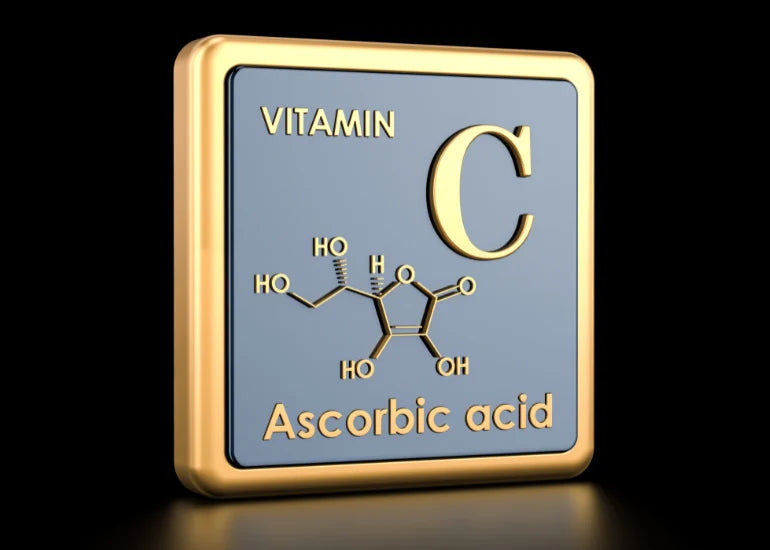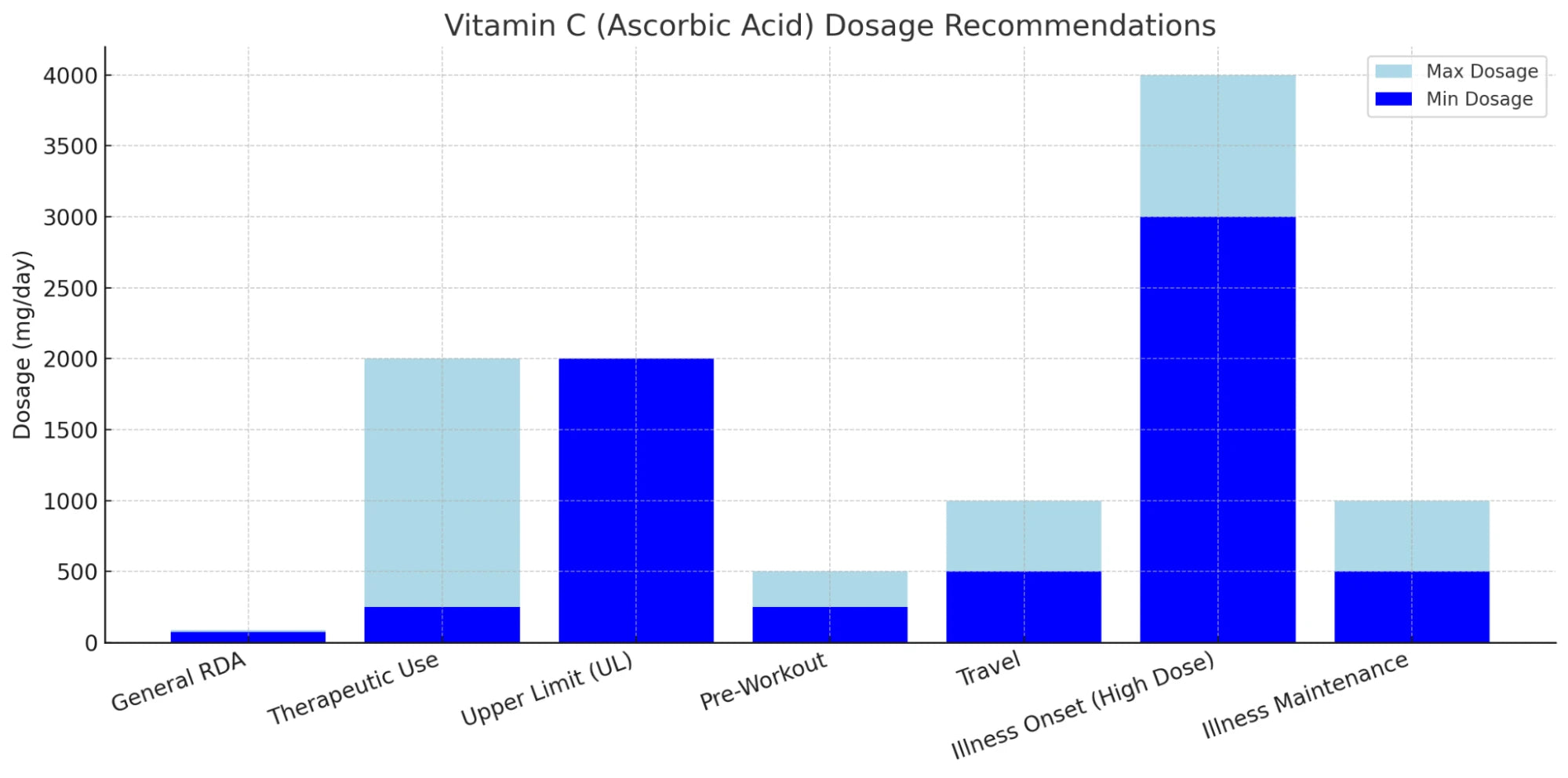
Vitamin C, also known as ascorbic acid, is one of the most essential and widely studied vitamins in human health. First discovered in the early 1900s as a cure for scurvy, a disease caused by severe vitamin C deficiency, it quickly gained recognition as a vital nutrient for immune strength, collagen production, and antioxidant defense.
Unlike many animals, humans cannot synthesize vitamin C internally, which makes daily intake through diet or supplements absolutely essential. It is a water-soluble vitamin, meaning it does not get stored in the body and must be replenished regularly.
Historically, sailors on long voyages would suffer from bleeding gums, fatigue, and poor wound healing symptoms that disappeared once they consumed citrus fruits. This discovery marked the beginning of our modern understanding of vitamin C's powerful role in cellular repair, immune regulation, and disease prevention.
Vitamin C is naturally found in fruits and vegetables like oranges, lemons, guavas, strawberries, and bell peppers. However, when it comes to supplements, ascorbic acid is often produced through a fermentation process involving glucose from corn or sugar beets. The result is a highly purified form of vitamin C that:
Vitamin C wears many hats in the body:
Simply put, vitamin C is a foundational nutrient your body needs every single day to function optimally.
Miduty's Lung Detox, Keto Electrolytes, and Ultimate Defence stand out for their advanced use of Vitamin C, offering immune and respiratory support far beyond standard supplements. What makes Miduty different is the inclusion of two highly effective forms of Vitamin C: L-ascorbic acid and Amla extract which together provide both rapid action and long-lasting antioxidant protection. Amla, a revered Ayurvedic superfruit, adds not only Vitamin C but also polyphenols that enhance its immune-boosting potential.
In Lung Detox, this dual-source Vitamin C works synergistically to fight oxidative stress caused by pollutants and toxins, protecting delicate lung tissues and reducing inflammation. Miduty's Keto Electrolytes also feature this dual-action Vitamin C blend, helping replenish nutrients during dehydration while defending the body from oxidative damage.
Additionally, the inclusion of kiwi extract, rich in Vitamin C and K, further enhances immune response, supports digestion, promotes glowing skin, and contributes to heart health. Miduty's commitment to combining bioavailable, natural, and synergistic forms of Vitamin C makes its formulations far more comprehensive and effective than most generic market options.
| Uses & Benefits | Description |
| Immune System Defense and Cold Prevention |
Vitamin C is one of the most trusted immune boosters and for good reason. It: [1]
|
| Collagen Synthesis for Skin, Hair, and Joint Health |
Vitamin C is critical for collagen biosynthesis; a protein that forms the structural framework of your: [3] [4]
|
| Antioxidant Protection Against Free Radicals |
Ascorbic acid is a potent antioxidant, meaning it neutralizes free radicals and unstable molecules that damage cells and DNA. These free radicals are generated by: [5] [6]
By blocking oxidative stress, vitamin C helps prevent:
|
| Iron Absorption and Cardiovascular Support |
Vitamin C significantly boosts the absorption of non-heme iron, the type of iron found in plant-based foods. This helps prevent iron deficiency anemia and enhances oxygen transport throughout the body. [8] Additionally, it may help:
|
| Brightens Skin and Reduces Hyperpigmentation |
Vitamin C is a favorite in the skincare world and for good reason:
For those with dull, dry, or uneven skin, consistent vitamin C intake leads to a noticeable glow-up. |
| Helps Manage Stress and Fatigue |
Vitamin C is rapidly used up during stress. High cortisol levels deplete this nutrient, making supplementation especially important for:
Studies show that vitamin C:
|
| Supports Brain Health and Neurotransmitter Function |
Vitamin C plays a lesser-known but critical role in the brain:
|
At the first sign of illness, vitamin C becomes a frontline defense start with 1,000 mg every 4-6 hours, not exceeding 3,000-4,000 mg/day for 2-3 days. Continue with a maintenance dose of 500-1,000 mg once symptoms ease.

While Vitamin C can be taken at any time, there are specific windows that optimize its impact:
Since it’s water-soluble and not stored by the body, smaller, repeated doses throughout the day are more effective than a single large one.
Vitamin C is popular among athletes and travelers due to its ability to:
At the first sign of illness, vitamin C becomes a frontline defense:
This approach:
Always stay well-hydrated when using higher vitamin C doses, as it increases urinary excretion.
Vitamin C is generally safe, but at doses above 2,000 mg/day, some individuals may experience:
To minimize this:
These issues are typically dose-dependent and temporary, resolving quickly after reducing intake.
Vitamin C can interact with certain medications or conditions:
However, these interactions are rare and usually associated with megadosing. For the general population, vitamin C is extraordinarily safe.
Vitamin C becomes even more effective when combined with:
Miduty's vitamin C formulations are often paired with these compounds for maximized efficacy and holistic wellness support.
Virtually everyone can benefit from vitamin C supplementation, but especially:
For these individuals, vitamin C is not a luxury, it’s a daily necessity.
Vitamin C is more than just a cold-fighter, it’s a multi-functional nutrient that supports everything from skin and immunity to stress and detox. And when taken in its purest, most bioavailable form as found in Miduty’s formulations it becomes a powerful ally for lifelong vitality.
In a world full of environmental stress, nutrient-depleted food, and immune threats, Miduty’s Vitamin C gives your body the foundation it needs to thrive..
Ascorbic acid, or vitamin C, is essential for tissue repair, wound healing, and maintaining healthy skin, bones, and blood vessels. It acts as a powerful antioxidant, boosts immunity, aids in iron absorption, and supports collagen production for structural strength in the body.
People with conditions like thalassemia, G6PD deficiency, sickle cell disease, hemochromatosis, or a history of kidney stones should be cautious with vitamin C supplements. Those undergoing dialysis, chemotherapy, or radiation should also consult a doctor before use, especially if there's a risk of iron overload.
Vitamin C is generally safe for daily use, with an RDA of 90 mg for men and 75 mg for women. Many take higher doses (250-1000 mg), but it's best not to exceed 2,000 mg per day to avoid side effects like diarrhea or stomach discomfort.
Yes, vitamin C and ascorbic acid refer to the same nutrient. Ascorbic acid is the chemical name for vitamin C, a water-soluble vitamin essential for many bodily functions, including immunity and tissue repair.
Yes, ascorbic acid (Vitamin C) is beneficial for lung health as it helps protect lung tissues from oxidative damage through its antioxidant properties. It may also support better lung function and reduce the risk of respiratory infections.
| Sr. No. | Reference |
|---|---|
| 1. | |
| 2. | |
| 3. | |
| 4. | Regulation of collagen biosynthesis by ascorbic acid: a review. |
| 5. | Topical Vitamin C and the Skin: Mechanisms of Action and Clinical Applications |
| 6. | |
| 7. | |
| 8. |
